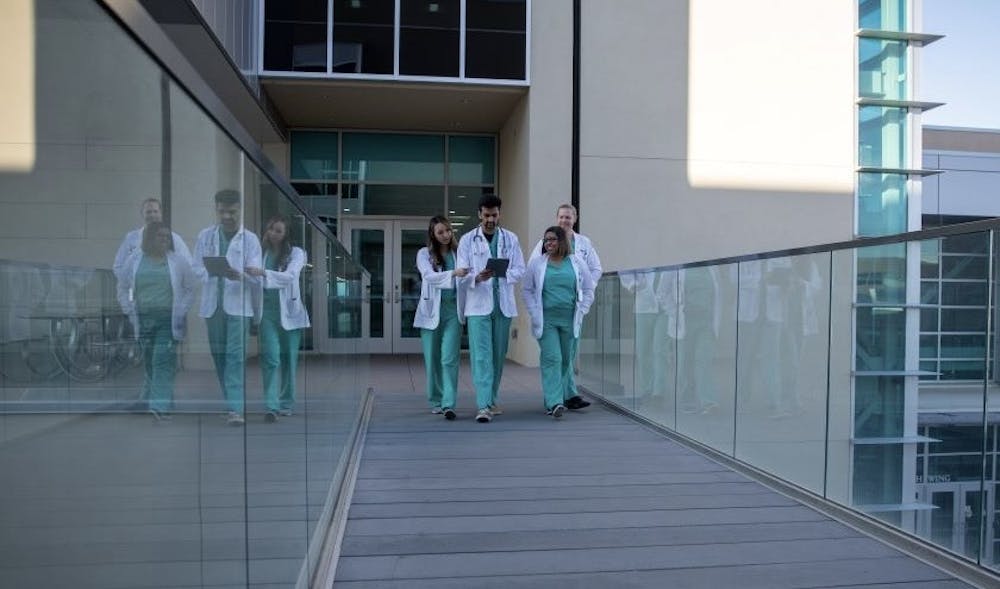Once considered heroes by the entire nation, now largely taken for granted while hospitals run at over 100% capacity, local healthcare workers are feeling burnt out from the COVID-19 pandemic as we enter over a year and a half of the crisis with people still refusing to get vaccinated.
At one point in the pandemic, there was a light at the end of the tunnel where things seemed to be returning to normal, according to Steve Nuanez, director of Employee Well-Being at the University of New Mexico Hospital. Now, however, New Mexico is seeing over 1,000 COVID-19 cases regularly again and Nuanez said UNMH is usually running at 140% capacity.
“With all these high levels of patients in the hospitals … there’s a lot of sense of ‘I can’t possibly do my job to its fullest capacity because there are too many people; there are too many patients,’” Nuanez said.
Elizabeth Lawrence, chief wellness officer and assistant dean for Professional Well-Being at UNM’s School of Medicine, referenced an article in the Atlantic that explained why 1 in 5 healthcare workers have quit their jobs since the pandemic began.
“There’s sort of a separate pandemic of mental health issues in providers, in clinicians, because of the trauma of seeing so much death, because of the trauma of feeling you’re not doing your best work, … because of the political trauma and people debating science,” Lawrence said.
Nursing resident Sarah Storbakken said it’s been difficult to treat “adults who refuse to get vaccinated, refuse to take precautions, and are now the ones who are in our beds. And we’ll be sending them to intubate them and telling them to say goodbye and they’ll be telling us that we’re lying.”
“The political tension is just, at this point, a willful ignorance and it’s just pure confirmation bias. They’re so deep in it now that they can’t be proved wrong because that means they’re horrible people, which they are at this point. They’d rather be right and die and kill the people around them than admit that they’re wrong,” Storbakken said.
According to Storbakken, some patients that are being put into intensive care units without much time left to live are asking too late to be vaccinated. Even her own uncle, who recently passed away, “had to be actively dying and his last conversation with his kids was to tell them to go get vaccinated.”
“I would say that’s hard — the compassion fatigue and just trying to have patience with these people who don’t, for lack of a better term, give a shit whether you live or die because they’re so wrapped up in their own ignorance … They don’t care about me at all because they think I’m lying and they think that they’re not dying, that this is all a hoax,” Storbakken said.
While healthcare workers have been considered heroes who treat all of their patients regardless of vaccination status, Nuanez said they need to be more realistically humanized.
Lawrence said daily gratitude practices can be extremely helpful to get through the days. Storbakken said that in addition to therapy, she tries to find small things that she enjoys doing each day.
Work culture is essential to aid in preventing or easing burnout, according to Nuanez. While individual tasks like meditating or gratitude practices also help, he said that those acts alone can’t solve everything.
Get content from The Daily Lobo delivered to your inbox
However, Storbakken said when she tried to reach out to her superiors for help during her time working at UNMH, they didn’t respond in a timely or effective manner. She had recently been diagnosed with ADHD and was ultimately let go at the 90-day review for “not learning fast enough.”
“I maybe naively was very honest about my struggles with my mental health and my new diagnosis because I had already been working there for a year previously so I thought I could confide in them … I didn’t know there was a deadline for me to be a perfect nurse, and I didn’t know that deadline was 90 days,” Storbakken said.
Storbakken said she was not made aware of areas that could have helped at the time, such as involving the union, the Committee of Interns and Residents. She wants to pursue a doctorate degree in psychiatric medicine in the future to ensure that this doesn’t happen again to others.
As for healthcare workers in the pandemic overall, Nuanez said it’s important for them not to blame themselves for burnout, which is a natural response in this type of situation.
“The fact is that it’s an imperfect system and we’re in the middle of a pandemic and it’s overloaded,” Nuanez said. “It’s predictable that people would start to get burnt out; it’s predictable that people would become exhausted.”
Lawrence said it’s important for individuals to “avoid stigmatizing the need for help” and that everyone needs “extra support during this time.” She recommended talking with others, such as counselors or peers, and referenced the peer supporters available at UNMH.
Storbakken said the booster shot can be the solution to permanently turning around the pandemic. Even while the political tensions rage, she said that factual science, like peer-reviewed studies on the Centers for Disease Control and Prevention website, can help people understand the reality of what the pandemic is.
“You just realize that these people that you thought cared about you don’t. Even patients — I don’t expect you to care for me like the way that I’m caring for you but I at least expect you to respect me as a human, as a human being,” Storbakken said.
Megan Gleason is the Editor-in-Chief of the Daily Lobo. She can be contacted at editorinchief@dailylobo.com or on Twitter @fabflutist2716






